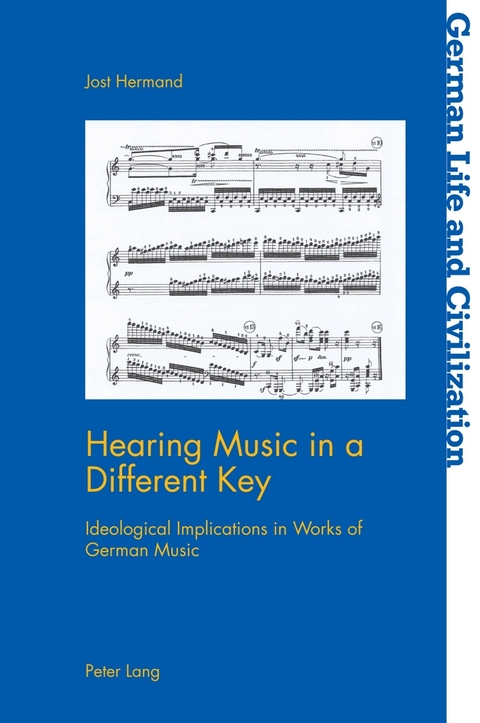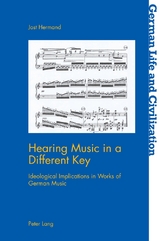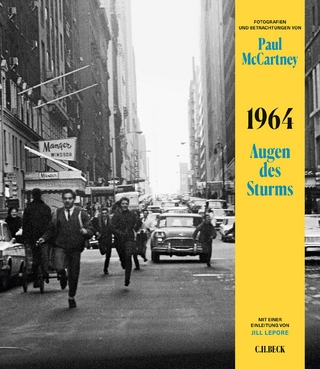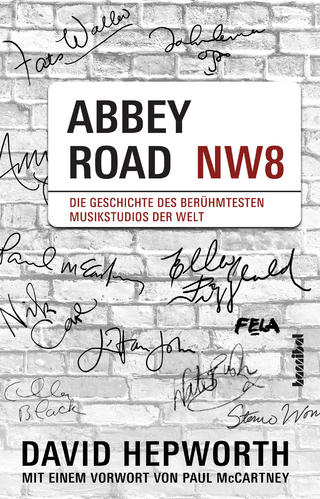Hearing Music in a Different Key
Peter Lang International Academic Publishers (Verlag)
978-1-80079-766-6 (ISBN)
«This volume epitomizes Jost Hermand’s inimitable talent of synthesizing wide-ranging disciplines in an accessible and compelling style, bringing to life the experiences of musicians and their public in the context of their own times. These essays also give us a glimpse into how his own life experiences created the hunger for culture that defined his long and illustrious career.» (Pamela M. Potter, Professor of German and Musicology, University of Wisconsin—Madison)
«Jost Hermand’s final book is an enormously rich gift to posterity. The fifteen essays on musical culture that constitute this collection contain brief but illuminating glimpses of the whole glorious parade of serious music and those who composed, cultivated, and commented on it in the German lands, from Buxtehude to Stockhausen and beyond. His insight and well-observed contextualization reveals a lifetime of scholarship and experience.» (Celia Applegate, Professor of History, Vanderbilt University)
In contrast to the writings of many other musicologists, this book is not primarily concerned with the biographies of certain composers or a structural analysis of their major compositions, but rather with the stands they took in the ideological struggles during their lifetimes and how these affected some of their most important works. Beginning with the late seventeenth century, special emphasis is thereby given to Pietism, orthodox Lutheranism, the impact of the French Revolution, the restrictive measures of the Metternich period, the Wilhelminian era, Expressionism, the New Objectivity and the materialist aesthetics of the Weimar Republic, fascism, exile and the modernism of the early Federal Republic of Germany.
Jost Hermand (1930–2021) got his Ph.D. at the Marburg University in German literature and art history. Since 1958 he taught German cultural history at the University of Wisconsin in Madison (USA). Between 2003 and 2013 he lectured as Honorary Professor of German at the Humboldt University in Berlin. Among his most important publications are a German cultural history in nine volumes (1959–2010) with Richard Hamann and Frank Trommler, a book about literary methodology entitled Interpretive Synthesis, books on the German opera, utopian thinking, the history of ecological awareness in Germany and German-Jewish history, as well as books on Ludwig van Beethoven, Heinrich Heine, Adolph Menzel and Bertolt Brecht.
Contents: Early Signs of Pietism in Protestant Church Music: Dieterich Buxtehude’s Evening Concerts in Lübeck (1667–1705) – More than Protestant Orthodoxy? Johann Sebastian Bach’s Church Cantatas (1713–1728) – Allons enfants de la musique: The Impact of the French Revolution on German Music (1789–1809) – «Moving Ahead» Even in «Desolate Times»: Ludwig van Beethoven’s Piano Sonata Op. 111 (1822) – Hope and Disillusionment: Franz Schubert’s 600 Art Songs (1813–1828) – A Checkered Past: The History of the German National Anthem (1842 to the Present) – Richard Wagner’s Last Cause: The Vegetarian Gospel of His Parsifal (1882) – From the Shtetl to Wunsiedel: Gustav Mahler’s Symphony No. 1 (1889) – The Two Revolutions against Older Forms of Bourgeois Music: Expressionism and Materialist Aesthetics (1910–1933) – Deepest Misery – Highest Art: Alban Berg’s Wozzeck (1925) – Conformism or Refusal? Paul Hindemith’s Mathis the Painter (1935) – More than an Aberration? Hanns Eisler’s Fourteen Ways to Describe the Rain (1941) – The Hidden Meaning: Richard Strauss’s Metamorphoses for 23 Solo String Players (1945) – The Supposedly Apolitical «Modernism» in the Serious Music of the Early Federal Republic of Germany: Karlheinz Stockhausen’s Groups for 3 Orchestras (1958) – Avant- Garde, Modern, Postmodern: The Music that (Almost) Nobody Wants to Hear Any Longer.
| Erscheinungsdatum | 15.06.2022 |
|---|---|
| Reihe/Serie | German Life and Civilization ; 74 |
| Mitarbeit |
Herausgeber (Serie): Kristopher Imbrigotta |
| Verlagsort | Oxford |
| Sprache | englisch |
| Maße | 152 x 229 mm |
| Gewicht | 430 g |
| Themenwelt | Kunst / Musik / Theater ► Musik ► Pop / Rock |
| Geisteswissenschaften ► Geschichte | |
| Geisteswissenschaften ► Sprach- / Literaturwissenschaft ► Anglistik / Amerikanistik | |
| Geisteswissenschaften ► Sprach- / Literaturwissenschaft ► Germanistik | |
| Geisteswissenschaften ► Sprach- / Literaturwissenschaft ► Literaturwissenschaft | |
| ISBN-10 | 1-80079-766-4 / 1800797664 |
| ISBN-13 | 978-1-80079-766-6 / 9781800797666 |
| Zustand | Neuware |
| Haben Sie eine Frage zum Produkt? |
aus dem Bereich




